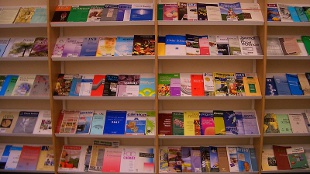 WIKIMEDIA, VMENKOVImagine trying to do scientific research without access to the majority of work previously published in the primary literature. As an undergraduate at the University of the Philippines 5 years ago, this was exactly the situation I faced as I began my thesis project researching neuroactive peptides in sea snails. My school did not have subscriptions to the online academic journal databases that are ubiquitous at universities in the developed world, so I got creative. I reached out to the authors of papers relevant to my research, asking for copies of their articles and more information about their research. Often, I was successful. Other times, however, the researchers simply sent me paywalled links I could not access, or did not respond at all, perhaps because they never received my queries. Many academic servers automatically filter emails which do not come from addresses that end with .edu, and many 3rd world schools do not have dedicated email addresses for their students. I was sending my correspondence using a Yahoo account, so my emails may have not been getting through in the first place. In the end, I was forced to depend on the open-access journals in my field, the list of which I had practically memorized by the end of my senior year.
WIKIMEDIA, VMENKOVImagine trying to do scientific research without access to the majority of work previously published in the primary literature. As an undergraduate at the University of the Philippines 5 years ago, this was exactly the situation I faced as I began my thesis project researching neuroactive peptides in sea snails. My school did not have subscriptions to the online academic journal databases that are ubiquitous at universities in the developed world, so I got creative. I reached out to the authors of papers relevant to my research, asking for copies of their articles and more information about their research. Often, I was successful. Other times, however, the researchers simply sent me paywalled links I could not access, or did not respond at all, perhaps because they never received my queries. Many academic servers automatically filter emails which do not come from addresses that end with .edu, and many 3rd world schools do not have dedicated email addresses for their students. I was sending my correspondence using a Yahoo account, so my emails may have not been getting through in the first place. In the end, I was forced to depend on the open-access journals in my field, the list of which I had practically memorized by the end of my senior year.
Now a graduate student at the SUNY Upstate Medical University in the United States, I consider myself fortunate to have free access to most of the journals I need. But the recent suicide of internet activist and RSS inventor Aaron Swartz has brought these old memories back. Swartz fought for open-access to the same peer-reviewed journal articles that I struggled to obtain in college. After his death, researchers around the world commemorated Swartz through a Twitter tribute sharing their articles freely through social media under the hash tag #PDFTribute. And now, other open-access advocates must take up the fight.
While subscription-based publishers are not giving in easily to the open-access push, researchers are ultimately responsible for the accessibility of their research. They should take charge ...














